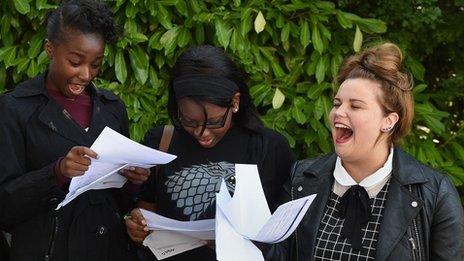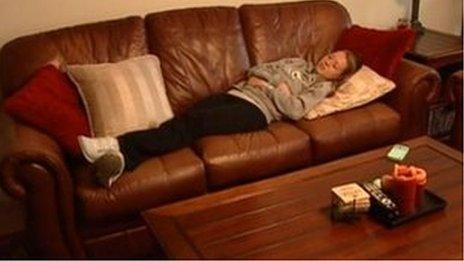Later school start time 'may boost GCSE results'
- Published
- comments

Many parents struggle to get their children out of bed in the morning
Thousands of teenagers are to get an extra hour in bed in a trial to see whether later school start times can boost GCSE results.
University of Oxford researchers say teenagers start functioning properly two hours later than older adults.
A trial tracking nearly 32,000 GCSE pupils in more than 100 schools will assess whether a later school start leads to higher grades.
Improved mental health and wellbeing could also result, the scientists say.
Professor of sleep medicine Colin Espie said: "Our grandparents always told us our sleep is incredibly important.
"We have always known that, but it's only recently that we've become engaged in the importance of sleep and circadian rhythm.
"We know that something funny happens when new teenagers start to be slightly out of sync with the rest of the world.
"Of course, your parents think that's probably because you're a little bit lazy and opinionated, if only you got to bed early at night, then you would be able to get up early in the morning.
"But science is telling us, in fact there are developmental changes during the teenage years, which lead to them actually not being as tired as we think they ought to be at normal bedtime and still sleepy in the morning.
"What we're doing in the study is exploring the possibility that if we actually delay the school start time until 10am, instead of 9am or earlier, that additional hour taken on a daily dose over the course of a year will actually improve learning, performance, attainment and in the end school leaving qualifications."
He added: "If we adapt our system to the biological status of the young person, we might have more success than trying to fit them into our schedules."
Prof Russell Foster, director of sleep and circadian neuroscience at Oxford University, said that getting a teenager to start their day at 07:00 is like an adult starting theirs at 05:00.
'Results boost'
He also highlighted the results of a small trial at Monkseaton High School in North Tyneside where school start times were shifted from 08:50 to 10:00. This led to an increase in the percentage of pupils getting five good GCSEs from about 34% to about 50%.
Among disadvantaged pupils, the increase had been from about 19% to about 43%, he said.
Now in the wider, year-long study starting next September, Year 10 and 11 pupils at more than 100 schools will be divided into two groups, with one starting school at 10:00, and the other following the usual school timetable.
Both sets of pupils will also be given education on the importance of getting enough sleep.
Pupils' results will be assessed before the trial and at the end, and comparisons drawn between the late start and normal start time groups.
Some pupils will be fitted with non-invasive bio-telemetric monitoring devices recording their sleep-wake patterns. Analysis of these results will be fed into the study as well.
The study is one of six projects funded by £4m from the Education Endowment Foundation and science charity the Wellcome Trust, looking at how the application of neuroscience can improve teaching and learning in schools.
Education Endowment Foundation chief executive Kevan Collins said: "We're delighted to be researching these cutting-edge strategies based on the latest knowledge in neuroscience."
- Published3 October 2014

- Published21 August 2014

- Published26 August 2013
